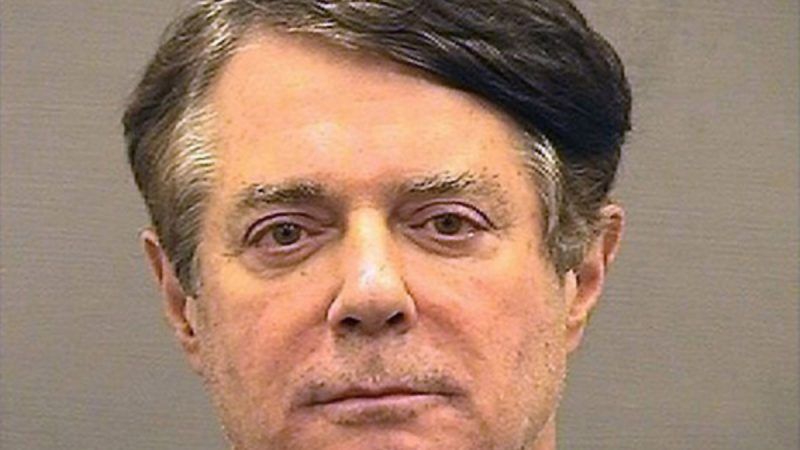New York Legislators Approve Double Jeopardy for Trump Cronies to Protect 'the Rule of Law'
The bill allows dual prosecutions of people in the president's orbit who receive pardons or commutations.

Yesterday the New York State Assembly approved a bill that carves out an exception to the state's ban on dual prosecutions for people associated with the president who benefit from an act of clemency after being prosecuted for a federal crime. Senate Bill 4572, which the state Senate already has passed and Gov. Andrew Cuomo supports, does not mention Donald Trump by name, but it is aimed at making sure that his cronies can still be prosecuted under state law if he pardons them or commutes their sentences.
The high-minded rationale for S.B. 4572 is that a president should not be able to suppress damaging information that might emerge from state prosecution of former underlings by pardoning them for federal offenses that are also criminal under New York law. "Either in the past or in a continuing manner, the president has talked about using the pardon power in a corrupt way to undermine the rule of law," said the bill's Senate sponsor, Todd Kaminsky, a Democrat who represents part of Long Island. "I think New York doesn't have to sit by and let the capricious use of the pardon power tie its hands."
The low-minded rationale for Kaminsky's bill is that Democrats who detest Trump want to take advantage of any weapon they can find to hurt him and people associated with him, especially since impeachment seems to be off the table. But in their eagerness to attack their political opponents, the Democrats who control New York's legislature are compromising an important principle of justice.
The U.S. Supreme Court has long held that people can be prosecuted for the same conduct under both federal and state law, notwithstanding the constitutional ban on double jeopardy, because an act criminalized by "separate sovereigns" constitutes two distinct offenses. In a case the Court is considering right now, a man convicted of illegal gun possession under both state and federal law is asking the justices to revisit that dubious doctrine, which allows double punishment for the same crime and new prosecutions of defendants who have been acquitted. But 20 states, including New York, already have laws aimed at preventing such outcomes.
New York's law says "a person may not be twice prosecuted for the same offense" and "a person may not be separately prosecuted for two offenses based upon the same act or criminal transaction." There are exceptions to that rule, but none of them covers self-protecting pardons by Donald Trump. Hence the perceived need for S.B. 4572, which applies to former executive branch officials who served in positions requiring Senate confirmation, former members of the president's executive staff, and former employees of his campaign, transition team, businesses, or nonprofit organizations who benefit from his clemency after they are prosecuted for federal offenses.
In case those broad categories don't do the trick, the new exception also encompasses anyone who "bears accessory liability" for crimes committed by people associated with the president. There are also catchall categories for acts of clemency that help the president avoid "potential prosecution or conviction," that are related to crimes that benefited him, or that provide relief for a person who has information "material to the determination of any criminal or civil investigation, enforcement action or prosecution" involving the president.
If the goal of the law were limited to the one described by Kaminsky, you might think those last three categories would suffice. Why throw everyone connected to Trump under the bus if state prosecutions are allowed in cases where it can be shown that a pardon or commutation helped him avoid civil or criminal liability? The breadth of the new exception makes sense if it is a cudgel to beat Trump allies, less so if it is all about preventing him from "using the pardon power in a corrupt way to undermine the rule of law."
Consider former Trump campaign chairman Paul Manafort, who was sentenced to nearly eight years in federal prison for crimes unrelated to his work on the campaign. Manafort might or might not know things that would support civil or criminal action against the president. But under this bill, New York could prosecute him again for the same conduct (bank fraud, say) even without making that showing (since he is a former campaign official) if Trump decides to pardon him or commute his sentence. It would not matter if Trump's sole motivation was sympathy for someone he sincerely thought got a raw deal. New York prosecutors could still try to send Manafort back to prison.
The same would be true of many other people in Trump's orbit—including former secretaries, second cousins, and low-level campaign employees—who are convicted of federal offenses, even if the crime seems minor and the punishment disproportionate. Trump could still use his clemency power to help such a person, but that would not stop New York prosecutors from trying him again for the same conduct, assuming they can find a state law that applies.
If, say, Trump commuted the mandatory minimum sentence of a drug offender who once worked for one of his businesses, she would still be subject to state prosecution for the same crime. Meanwhile, a similarly situated defendant who committed the same offense but never made the mistake of working for Trump would not have to worry about a second prosecution. Call that distinction whatever you like, but it surely does not seem like upholding the rule of law.
[This post has been revised to correct the first name of New York's governor.]


Show Comments (69)